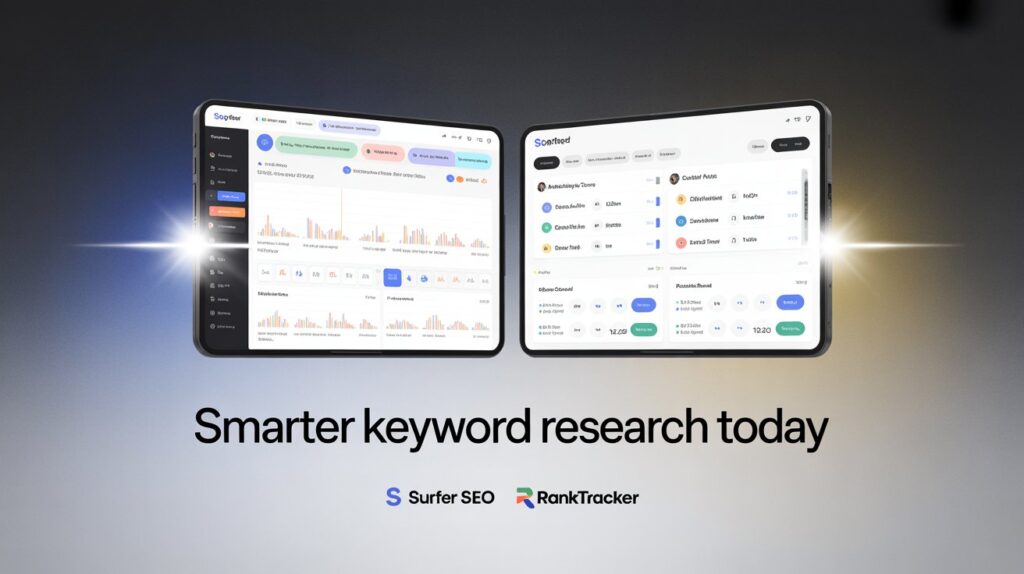
Choosing the right SEO tool can make or break your content strategy. Two popular options dominating the market are Surfer SEO vs Ranktracker, each promising to revolutionize how you approach keyword research and content optimization.
Both platforms offer unique strengths that cater to different SEO needs. Surfer SEO has built its reputation on comprehensive content optimization, while Ranktracker focuses on robust keyword tracking and research capabilities. This detailed comparison will help you understand which tool aligns better with your specific goals, budget, and workflow requirements.
What is Surfer SEO?
Surfer SEO is a content optimization platform that analyzes top-ranking pages to provide data-driven recommendations for your content. The tool examines factors like keyword density, content length, headings structure, and semantic keywords to help you create content that ranks higher in search results.
The platform’s standout feature is its Content Editor, which provides real-time optimization suggestions as you write. This makes it particularly valuable for content creators who want to ensure their articles are SEO-optimized before publication.
Key Surfer SEO Features
Content Editor: The real-time content optimization tool guides you through creating SEO-friendly content with specific recommendations for keyword usage, content length, and structure.
SERP Analyzer: Analyzes top-ranking pages for any keyword, providing insights into what makes them successful and how you can compete.
Keyword Research Tool: Discovers related keywords and provides search volume data, though this isn’t the platform’s primary strength.
Content Planner: Helps organize your content strategy by identifying keyword clusters and content gaps.
Audit Feature: Evaluates existing content and suggests improvements based on current ranking factors.
What is Ranktracker?
Ranktracker positions itself as an all-in-one SEO platform with a strong emphasis on keyword research and rank tracking. The tool provides comprehensive keyword data, competitor analysis, and backlink insights to help you build a complete SEO strategy.
Unlike content-focused tools, Ranktracker excels at providing detailed keyword metrics, search volume trends, and competitive intelligence that helps you identify opportunities before creating content.
Key Ranktracker Features
Keyword Finder: Advanced keyword research tool that discovers thousands of keyword opportunities with detailed metrics including search volume, keyword difficulty, and trend data.
Rank Tracker: Monitors your website’s position for target keywords across different search engines and locations.
SERP Checker: Analyzes search engine results pages to understand competition and identify ranking opportunities.
Backlink Checker: Evaluates your backlink profile and identifies link-building opportunities.
Web Audit: Comprehensive site audit that identifies technical SEO issues affecting your rankings.
Competitor Research: Analyzes competitor strategies, keywords, and backlinks to inform your SEO approach.
Keyword Research Capabilities Compared
When evaluating these tools specifically for keyword research, several key differences emerge that could influence your decision.
Surfer SEO’s Keyword Research Approach
Surfer SEO treats keyword research as part of a broader content optimization process. The platform excels at finding semantically related keywords that should be included in your content to improve topical relevance.
The keyword research functionality focuses on content clusters rather than individual keyword analysis. This approach works well when you’re planning comprehensive content strategies around specific topics.
However, Surfer SEO provides limited keyword volume data and fewer filtering options compared to dedicated keyword research tools. The platform assumes you’ll use it primarily for content optimization rather than initial keyword discovery.
Ranktracker’s Keyword Research Strengths
Ranktracker’s Keyword Finder tool offers more comprehensive keyword research capabilities. The platform provides detailed metrics for thousands of keyword variations, including precise search volumes, keyword difficulty scores, and trend analysis.
The tool excels at competitive keyword analysis, showing you which keywords your competitors rank for and identifying gaps in your own strategy. This competitive intelligence feature proves particularly valuable for businesses in competitive niches.
Ranktracker also offers better filtering and sorting options, allowing you to narrow down keyword lists based on specific criteria like search volume ranges, difficulty scores, or commercial intent.
User Interface and Ease of Use
Both platforms prioritize user experience, but they approach interface design differently based on their core functionalities.
Surfer SEO’s Interface Design
Surfer SEO features a clean, intuitive interface that guides users through the content creation process. The Content Editor resembles a familiar word processor with an additional sidebar containing optimization recommendations.
The platform uses color-coding and progress bars to make optimization suggestions easy to understand, even for SEO beginners. The visual approach helps users quickly identify areas that need improvement without getting overwhelmed by technical details.
Navigation between different tools within Surfer SEO feels seamless, though the platform can feel limited if you’re looking for extensive keyword research capabilities beyond content optimization.
Ranktracker’s Dashboard Experience
Ranktracker offers a more comprehensive dashboard that accommodates multiple SEO functions. The interface provides quick access to keyword research, rank tracking, and competitor analysis tools from a central hub.
While the platform includes more features, the interface remains organized and user-friendly. The keyword research tools provide detailed data tables that can be customized and exported for further analysis.
The learning curve for Ranktracker might be slightly steeper due to the breadth of features, but the platform includes helpful tutorials and documentation to guide new users.
Pricing and Value Analysis
Understanding the cost structure of each platform helps determine which offers better value for your specific needs and budget.
Surfer SEO Pricing Structure
Surfer SEO offers three main pricing tiers, starting with the Basic plan for individual content creators and scaling up to Agency plans for larger teams. The pricing reflects the platform’s focus on content optimization, with limits on the number of content editors and audits per month.
The platform includes most features across all plans, with higher tiers offering increased usage limits rather than additional functionality. This approach works well for content-heavy businesses that need consistent optimization capabilities.
Ranktracker Cost Considerations
Ranktracker provides multiple pricing options designed to accommodate different business sizes and needs. The platform’s pricing structure reflects its comprehensive feature set, with different tiers offering varying levels of keyword tracking, research capabilities, and competitor analysis.
The entry-level plans provide substantial value for small businesses or individual marketers who need robust keyword research capabilities without the higher costs associated with enterprise SEO tools.
Integration and Workflow Compatibility
How well each tool integrates with your existing workflow and other marketing tools can significantly impact your productivity and results.
Surfer SEO Integrations
Surfer SEO integrates with popular content management systems and writing tools, including Google Docs, WordPress, and Jasper AI. These integrations streamline the content creation process by allowing you to access optimization recommendations directly within your preferred writing environment.
The platform also connects with Google Search Console to provide additional data about your content’s performance, helping you understand how optimizations translate into actual ranking improvements.
Ranktracker’s Connectivity Options
Ranktracker offers integrations with various SEO and marketing tools, including Google Analytics, Google Search Console, and popular social media platforms. These connections provide a more comprehensive view of your SEO performance across different channels.
The platform’s API access allows for custom integrations and automated reporting, which proves valuable for agencies or businesses with specific workflow requirements.
Performance and Accuracy
The reliability and accuracy of SEO data directly impacts the effectiveness of your optimization efforts.
Data Quality Comparison
Both platforms source their keyword data from reputable providers, but they present and interpret this information differently. Surfer SEO focuses on providing actionable content recommendations based on SERP analysis, while Ranktracker emphasizes comprehensive keyword metrics and competitive intelligence.
Surfer SEO’s strength lies in its real-time SERP analysis, which provides current insights into what’s working for top-ranking pages. This approach ensures your content optimization strategies reflect the most recent ranking factors.
Ranktracker excels at providing historical trend data and competitive keyword analysis, helping you identify long-term opportunities and understand market dynamics over time.
Making Your Decision: Which Tool Fits Your Needs?
The choice between Surfer SEO vs Ranktracker ultimately depends on your primary SEO objectives and workflow preferences.
Choose Surfer SEO if you prioritize content optimization and want a tool that guides you through creating SEO-friendly articles. The platform works best for content marketers, bloggers, and businesses that focus heavily on organic content creation.
Ranktracker suits users who need comprehensive keyword research capabilities, competitive analysis, and rank tracking functionality. The platform works well for SEO agencies, competitive businesses, and marketers who require detailed keyword intelligence before content creation.
Transform Your SEO Strategy Today
Both Surfer SEO vs Ranktracker offer valuable capabilities that can improve your search engine rankings, but they serve different aspects of the SEO process. Surfer SEO excels at content optimization and ensuring your articles meet current ranking factors, while Ranktracker provides the keyword research foundation and competitive intelligence needed for strategic SEO planning.

I am Ray Jones Digital
My current occupations: a Digital Marketer, Local SEO expert, Link Builder, and WordPress SEO specialist. Shopify SEO, Ecommerce Store Management, and HTML & WordPress Developer I have been practicing the above mentioned services for more than 10 years now As an SEO expert working with your ongoing projects.



